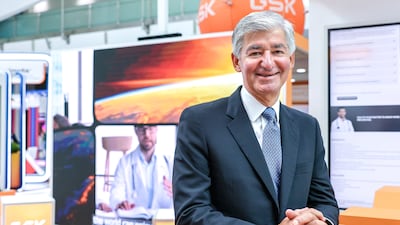Growing resistance to antibiotics and other medications is a major global health emergency that drug providers and governments need to take more seriously, the head of pharmaceutical giant GlaxoSmithKline has warned.
Antimicrobial resistance (AMR) claims the lives of almost 1.2 million people a year as a result of drug-resistant infections.
Speaking on the sidelines of Abu Dhabi Global Health Week, Sir Jonathan Symonds, global chairman of GSK, called for a unified approach against the threat.
global chairman of GSK
“AMR is a central part of infectious disease, it’s not just about preventative vaccines,” Sir Jonathan told The National.
“Millions of people are dying a year through uncontrolled flu infections, partly because there's not enough investment in antibiotics or anti-infective medicines.
“The world needs to embrace AMR more seriously than it does, with much greater education and understanding of the threat of antimicrobial resistance.
“The industry as a whole has got to take it more seriously, as this is one of the biggest health emergencies the world has.”
AMR occurs when drugs used to treat infections caused by bacteria, parasites and viruses are no longer effective.
When these bugs are exposed to drugs over a period of time, they develop resistance, limiting the number of medications at the disposal of doctors to fight infection.
Antibiotic abuse
Over-use of antibiotics worldwide has contributed to the problem, and could make some aspects of modern medicine, such as organ transplants or caesarean sections, too risky in the future.
“Getting ahead of disease and prevention is where we want to become distinctive,” said Sir Jonathan.
“Our view is that health systems around the world cannot continue treating sick people.
“When you look at especially sick people that are ageing with an increasing incidence of chronic disease, the economic cost burden becomes unsustainable.
“We have to allocate more and more of our resources to understand where the optimal point of intervention is by early detection of cancer, or prevention through therapeutics and vaccines, which actually deals with that early stage of disease.
“It is an important moment for both health systems and the industry to find that point of intervention.”
GSK’s global chairman was speaking after the launch of a partnership between the drug manufacturer and the Department of Health, Abu Dhabi, to develop a vaccines distribution hub in the capital.
The collaboration will establish a regional centre, and explore new opportunities to exchange knowledge in Abu Dhabi’s life sciences division to address key public health challenges.
New partnership
The partnership builds on the foundation developed during the Covid-19 pandemic.
In June 2021, Abu Dhabi became the first city to receive Sotrovimab, a GSK-developed drug that eased the symptoms of the most critically ill Covid patients.
More than 23,000 people benefited from the drug, and the partnership opened new doors for research collaboration.
A new GSK vaccine hub is expected to have a similar regional impact, distributing vital immunisation around the world.
“Thanks to Abu Dhabi’s close-knit community, diverse population, and continued investments in healthcare infrastructure, the city is ideally equipped to help make access to quality, responsible innovative healthcare a reality for all,” said Dr Noura Khamis Al Ghaithi, undersecretary of the Department of Health – Abu Dhabi.
“Reinforcing Abu Dhabi’s position as a leading destination for health life science, the department’s collaboration with GSK enhances healthcare services, ensuring drug and vaccine security.
“By cultivating partnerships on the global stage, Abu Dhabi has earned a catalyst role in strategically mapping the future trajectory of the healthcare industry, focusing on improving patient outcomes, strengthening healthcare systems, and promoting equitable access to essential medicines and vaccines.”













